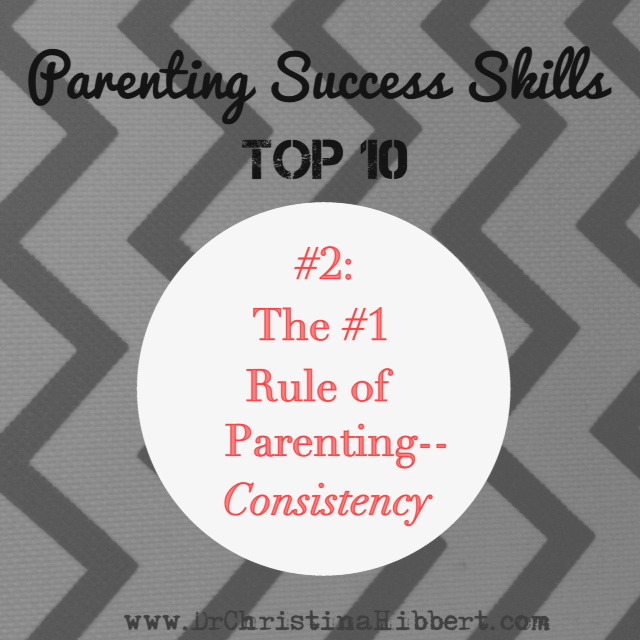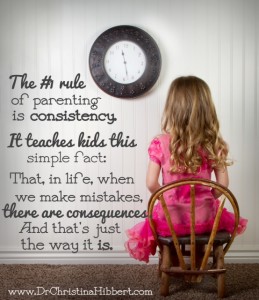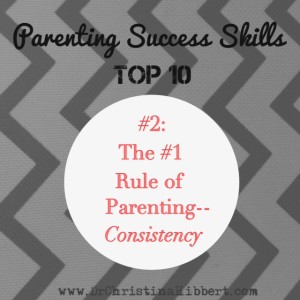
14 Sep Parenting Success Skills Top 10: #2 The #1 Rule of Parenting–Consistency
If you ask me, “What is the number one rule of parenting?” I will say, “Consistency.” So, why is it #2 on my Top 10 Parenting Success Skills? Well, as I mentioned in my article, Parenting Success Skills Top 10: #1 “Do Your Own Work First,” I had to move it to number two on my parenting success skill list because if you haven’t done your own work, none of the other tips will help. Doing our own work first is the number one skill of parenting.
That being said, I still believe the number 1 rule of parenting is consistency.
Consistency–The #1 Rule of Parenting
Kids need to know what to expect. They need structure in order to thrive. And, structure and expectations only work if they’re consistent. You can’t create household rules or family laws if they are not enforced, just like we could never have safe roads if no one obeyed the traffic laws. Consistency is the key to discipline. How can we teach kids to improve behavior when the rules and consequences constantly change? It’s also important in helping kids know what to expect as far as the rules of the house, family values, and consequences go.
But consistency is also important in our own behavior, as parents. Kids need to be able to count on the fact that Mom won’t completely lose it if they make a simple mistake, or that Dad will be loving even if he’s too tired. That’s why it’s so important to “Do our own work first”–so we can model the behavior we desire for our kids, so we can make sure our own “issues and mistakes” don’t get in the way of our parenting skills, and so we can love our kids even better. When we are consistent in our behavior toward our kids–in how we discipline, teach, and model behavior for them–our kids will not only behave better. They’ll learn and grow more successfully too. (And so will we parents.)
What prevents consistency?
Let’s be honest. Sometimes, we feel “sorry” for our kids, and that affects our consistency. We give in, go back on our word, give up! But, most of the time, we fail to be consistent because we’re just plain worn out! It’s tiring be a mom or dad, and following through is a tough job. That’s why it’s so important to work on our methods for consistency before trouble hits—so we’ll know exactly what to do (and have the strength to do it) when the time comes.
6 Ways to be more Consistent!
Here are 6 things I have learned and used to help me be more consistent with my kids. I hope they will help you be more consistent in your parenting skills too!
1) Know why you’re doing what you’re doing.
It’s hard to be consistent in discipline, rules, and expectations when you don’t really know why you’re doing it, or don’t really believe in what you’re doing. Ask yourself, “Does this rule really matter to me? Why or why not?” If it doesn’t, what does matter? If it does, remind yourself of why you’re following through on it. This goes for values you want to teach too. Get in touch with what really matters to you as a parent and consistently do those things.
2) Learn about the principles of reinforcement.
This is an area of psychology that helps us understand how human and animal behavior becomes  conditioned. It has helped me tremendously as a parent. In very simple terms, continuous reinforcement (giving a reward or punishment every single time) is the quickest way for us to learn a behavior. Think of training a dog. If he knows he gets a treat every time he rolls over, he’s more likely to learn to do it. Kids are the same. They need continuous reinforcement if we want them to learn something new. After a while, though, spaced out rewards are more effective. This is intermittent reinforcement. Intermittent reinforcement is a great way to keep a behavior going after it has been learned. Think of a slot machine, where you’re always hoping for the big payoff! That’s intermittent reinforcement.
conditioned. It has helped me tremendously as a parent. In very simple terms, continuous reinforcement (giving a reward or punishment every single time) is the quickest way for us to learn a behavior. Think of training a dog. If he knows he gets a treat every time he rolls over, he’s more likely to learn to do it. Kids are the same. They need continuous reinforcement if we want them to learn something new. After a while, though, spaced out rewards are more effective. This is intermittent reinforcement. Intermittent reinforcement is a great way to keep a behavior going after it has been learned. Think of a slot machine, where you’re always hoping for the big payoff! That’s intermittent reinforcement.
The thing is, these principles work for negative behavior too. If your child knows there’s a consequence every time he misbehaves, he’s more likely to stop the negative behavior. If he knows he might not really get in trouble every time he talks back, however, you’re dealing with a slot machine. He’s gonna take his chances and hope he wins big! And, get this: Being inconsistent with consequences even one time can give your child hope for the slot machine payoff, making her more likely to roll the dice with bad behavior. That’s why being consistent, especially with discipline, is so important!! Remembering these principles can be highly motivating to us parents when we’re feeling too tired to follow through.
3) Create household rules or family laws, write them down, and post them.
If they’re in writing, they’re much easier to enforce, helping you be more consistent. It also prevents you from having to decide what to be consistent on, because it’s already settled! We created family “laws” several years ago in a family meeting. I asked for input from all the kids, we created a list, then consolidated little rules into main “laws.” I typed and printed them, and they’ve been hanging on our fridge ever since. We’ve updated them as the kids have gotten older, but for the most part, they’ve stayed the same. If a kid breaks a “law,” I simply point to it on the fridge and say, “Sorry. You know you better,” and implement the consequence that’s right for that kid. It makes it so much easier to be consistent in my discipline and in my own behavior when I have to discipline.
4) Think about the consequence before you say it.
If you’re not willing to follow through with a consequence, don’t say it! The best way is to give yourself time to figure out what you’re willing to do before you speak. In our house, we try to “make the consequence benefit us” (the parents). I know I don’t usually want to ground my little kids from play dates (I want some free time!) or my teenagers from going out (they just lay around and sleep!) but I DO love extra help with housework, early bedtimes, or help babysitting siblings (more free time!). Always give it thought before you commit. Because once you say it….
5) Once you say it, you must do it.
That’s why #2 is so important. (If you don’t remember why, go back and re-read #2!) Saying you’re going to do something and not doing it opens up the casino for business!
6) When following through, try to keep the emotion out of it.
It can be tough, for sure, when kids break the rules and you have to consistently follow through. It’s actually tougher on the parent than the child, most of the time! But, doing so in a matter-of-fact way is the best. Having written rules helps take the anger, frustration, and emotion out of following through. (If it’s there, in writing, you know they know about it. Often, you don’t even have to say a word—just point to the rule and the written consequence!) Keeping your own emotions in check not only models good behavior for kids, it: 1) shows kids you mean business, 2) helps them see they’re not “bad kids” and you don’t “hate them” for what they’ve done, and, 3) teaches them this simple fact: That, in life, when we make a mistake, there are consequences. That’s just the way it is.
[author] [author_image timthumb=’on’]http://www.drchristinahibbert.com/wp-content/uploads/2012/03/square-head-shot1.jpg[/author_image] [author_info]Clinical Psychologist, Mom of 6, Postpartum Couples DVD Producer, Non-Profit Founder, and expert on Parenting, Women’s Emotions, Pregnancy & Postpartum, and Grief & Loss, Dr. Christina Hibbert loves songwriting, learning, and teaching what she learns. (And trust me, she’s learning a lot about parenting, raising 4 sons and 3 daughters!)[/author_info] [/author]
Don’t miss a thing!
SUBSCRIBE, below, and please “like” my Facebook page and follow me on Twitter and Pinterest, for inspiration on the topics that matter to you!
[subscribe2]
Related Posts/Articles:
Parenting Success Skills Top 10: #1 Do Your Own Work First
Parenting Success: It’s More About the Parent Than the Child
Parenting Skills: 4 Ways We Learn to Parent, & The Good News About our Parenting Potential
Parenting Skills: Back-to-School Mental Health–7 Strategies for School-Year Sanity
Parenting Skills: “My Kids Are Driving Me Crazy!”–10 Ideas to Drive Us Back to Sane
Parenting Skills: “Sit Back & Enjoy the Ride!” Making the Most of Family Drive Time
Parenting Practice: Getting Good at the “Let-Go’s”
10 Major Mistakes I’ve Made This Month, & Why It’s OK
Let’s Get Real: 10 Confessions from “The Psychologist, The Mom, & Me”
“Mommy Fails” and Mother’s Day: 3 Messages All Moms Need to Hear
The 5 Love Languages: Improve Relationships & Feel the Love!
50 Ways to Love Your Loved Ones
Why I Feel Like a Loser Mom, & How I Know I’m Really Not
Achieving Balance: Why You’ve Got it Wrong, & How to Get it Right
16 Things I’d Like My Postpartum Self to Know, 16 Years & 6 Kids Later
Pregnancy & Postpartum Emotional Health
Siblings & Grief: 10 Things Everyone Should Know
Children & Grief: What You Need to Know
This is How We Grow Book Club: Join & Preview Chapters of My New Book!


Thanks for this!!! I’m curious to read more about the link for making the consequence benefit us but it doesn’t go directly to an article, just their home page. Would love to find that info, thank you!